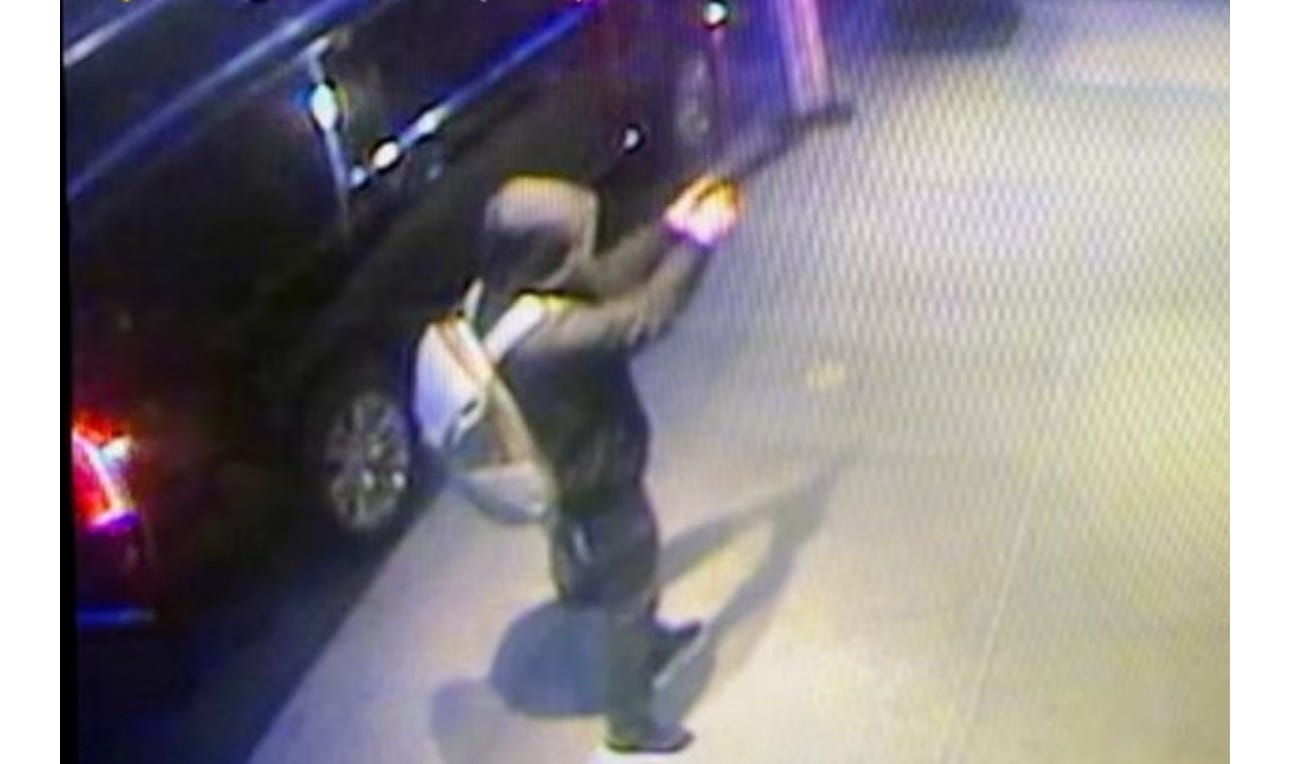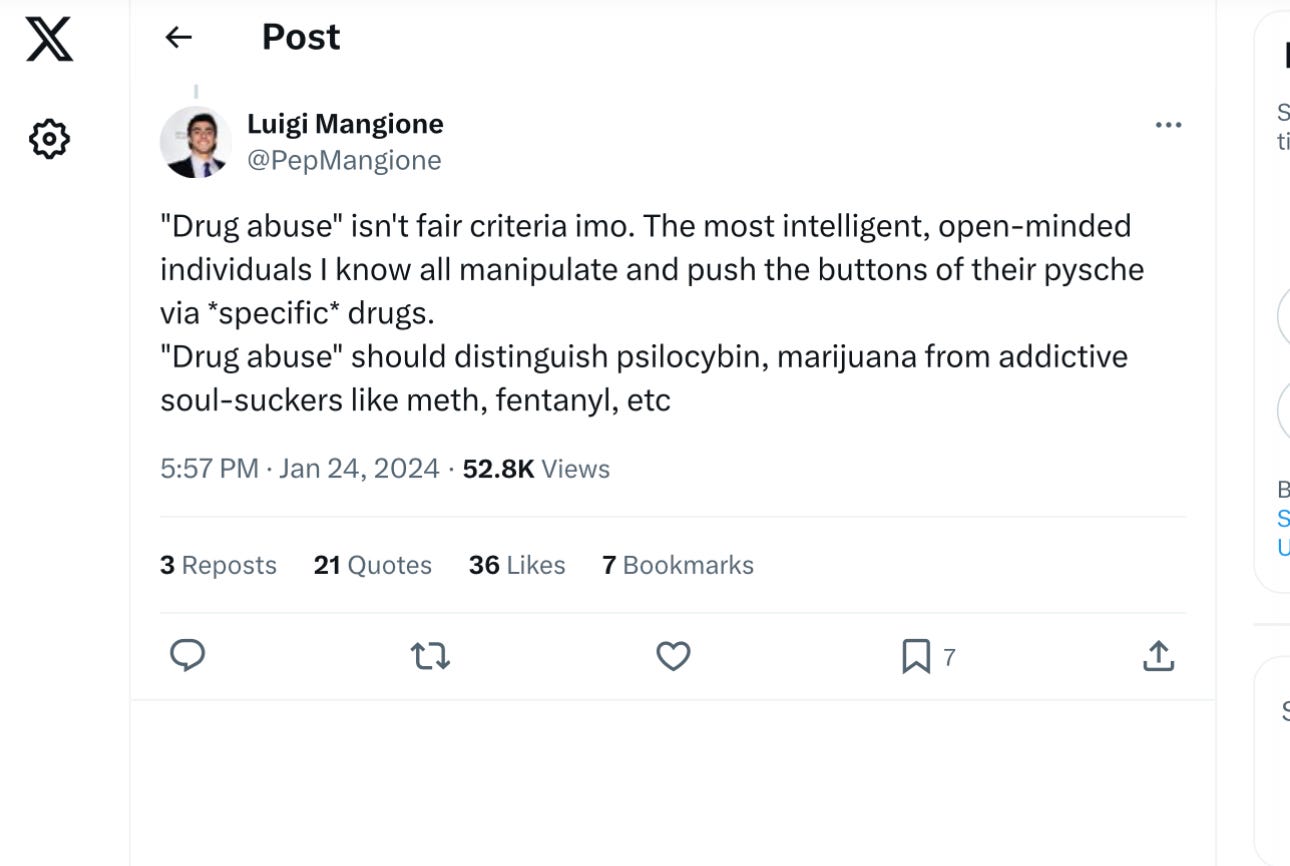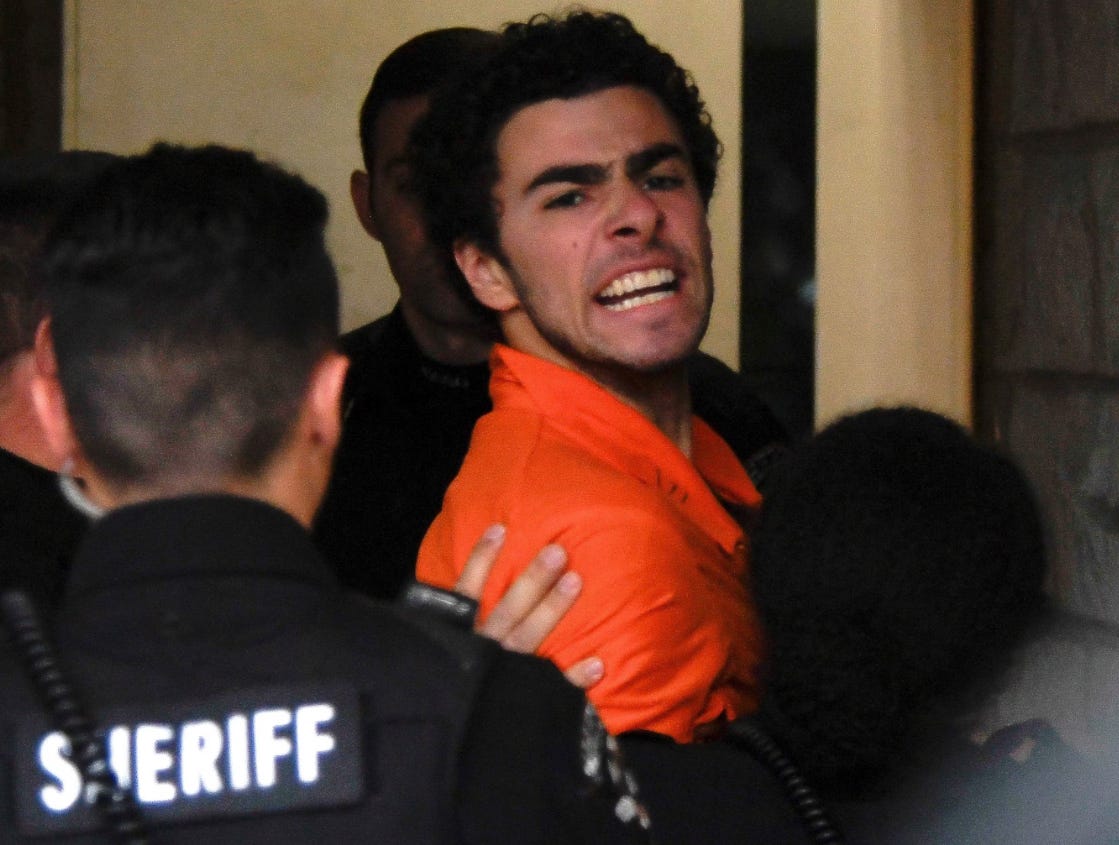An assassin for our time (PART TWO)
Luigi Mangione could have targeted ExxonMobil or Goldman Sachs. Instead he (allegedly) picked an insurance company executive. How did he wind up in the kingdom of the sick?
(Second of two parts. First is here.)
Luigi Mangione was sicker than he looked.
In online pictures, Mangione, the 26-year-old Maryland man who (allegedly) gunned down UnitedHealthcare chief executive Brian Thompson on a Manhattan street last week, seemed to be in great shape, a hot tech bro with ripped abs.
But in Reddit posts and to friends, Mangione painted a different picture, complaining of insomnia in 2018, irritable bowel syndrome in 2019, plus Lyme disease, even “brain fog.” He had a bad back too, bad enough to need surgery in 2023. Though it didn’t keep him from traveling, hiking, and carrying out a carefully planned murder.1
—
(Reading a lot; writing just enough (I hope). Join me.)
—
Mangione’s medical problems have received attention. They deserve more.
For the release of Mangione’s short “manifesto” on Tuesday shows his complaints about the health insurance industry to be essentially generic. They were unrelated to any specific denial of care or coverage that he faced or even claimed had hurt someone else.
In other words, Mangione could have as easily shot an executive at an oil company and blamed climate change, or killed a hedge fund manager over income inequality. Those are more obvious targets for a would-be domestic terrorist concerned about corporate greed, as Mangione claimed to be.
Instead, he focused his anger on health insurance, (allegedly) murdering Thompson, the chief executive of the largest American insurer, in cold blood.
His anger appears to stem not from he was treated but how he felt.
—
(But what about his back?)
—
The maladies about which Mangione complained included a bacterial illness, spinal deformities, digestive problems, and issues sleeping.
But all of them, including his back problems, land in the swamp of so much modern medicine, the place where physical and psychiatric maladies are nearly impossible to disentangle.
Metaphor as illness.
Such diseases are difficult and frustrating. Patients insist their afflictions are physical, not psychosomatic, and demand treatments. Physicians may suspect otherwise; they have few solid cures either way. And patients frustrated with conventional treatments often wind up seeking costly, unproven remedies from doctors who range from hopeful to aggressive to outright grifters.
—
Though they don’t usually wind up killing strangers in the street.
The media narrative about Mangione is facile and wrong (surprise, surprise): his illnesses explain his target, not his crime.2
And the crime was monstrous (even if woke journalists don’t think so).
The easy explanation is to call Mangione a psychopath who wanted attention and thought killing an executive would get it - that is, to write off the murder as overdetermined by Mangione’s inborn character defects.
But neither Mangione’s history nor the crime itself its suggests that view is right. Psychopathy is a fundamental character trait. True psychopaths almost always reveal their lack of empathy and cruelty by their early twenties. They rarely have real or close friends. People who knew them can easily point to signs of their degeneracy.
Mangione was the opposite, hard-working and apparently well-liked throughout high school, college, and in his first flush of post-collegiate life. People who knew him have expressed outright shock at his arrest.
Mangione also hid his face during his (alleged) crime. He didn’t take public credit for it and went to great lengths to avoid detection and capture, though he failed.
—
(Weird, his back looks fine here)
—
If not psychopathy, perhaps psychosis?
Psychiatrists use the term to describe breaks from reality. Psychotic episodes usually include some mix of disorganized thoughts, delusions, hallucinations, and paranoia. They’re a common driver of apparently senseless violence.
Unlike psychopathy, psychotic disorders, most notably schizophrenia, frequently do not begin until late adolescence or early adulthood. (Pity anyone who shows severe psychotic symptoms as a child, he has been dealt the cruelest of hands.)
So the timing makes far more sense if psychosis and not psychopathy drove Mangione.
But the details of the crime itself do not.
Severely psychotic people cannot plan in the way Mangione allegedly did. They’re too consumed with trying to function in a physical reality that doesn’t match their own.
In fact, psychosis-flavored murders usually look like the opposite of last week’s cool shooting. Whether committed against family members or strangers, they are generally brutal and impulsive. Frequently the killers use knives or other close-quarter weapons and “overkill” their victims - continuing to attack them even when they are already dead. Psychotic killers also often make no or minimal effort to flee.
—
(Unreported Truths, highly reported analysis. For under 20 cents a day. With your help.)
—
Nor do we have any evidence that any outside group radicalized Mangione, much less encouraged or directed this attack. Again: anti-corporate anger targets Big Oil or Wall Street or even Big Pharma far more than the insurance industry. Has anyone ever even referred to “Big Insurance”?
And Mangione claimed to be acting alone in his one-paragraph manifesto (minifesto?).
But something radicalized Luigi Mangione, and fast, since by all accounts even in 2022 he was living the dream in Hawaii, bad back and irritable bowels notwithstanding.
If not full-on organic psychosis or psychopathy, then what?
The most likely answer comes in pill, powder, or smokable form.
Now we enter the realm of speculation, because no hard evidence that Luigi Mangione used drugs has yet emerged.
But his reading list and X posts show he was both curious about and an advocate for cannabis and psychedelics. In January, he sang the praises of “psilocybin [and] marijuana,” distinguishing them from drugs he saw as more dangerous and addictive.
—
In moving after college to San Francisco and then a co-working community in Hawaii, Mangione put himself in two hotbeds for psychedelic and cannabis use. And he worked in a coding subculture where drug use is not merely condoned but encouraged.
On the other hand, Mangione never actually mentioned using drugs, at least not in any public post anyone has yet unearthed. In fact, in his 2018 Reddit post about his insomnia, he said he didn't use alcohol, nicotine, or even caffeine.
When Mangione traveled to Asia this spring, he went to Japan, a country with strict laws and attitudes toward drug use. And when the police arrested him in Pennsylvania on Monday, they didn't report finding any drugs on him, though he could easily have bought cannabis or even mushrooms in New York.
—
Yet cannabis and psychedelic use - and the paranoia they so frequently produce in regular users - still seem the most likely fuel for Mangione’s decline.
Not just because of his public advocacy. Patients with quasi-psychiatric illnesses like his often find themselves looking for plant cures they feel are natural. And if those cures happen to get them high, so much the better.
Unlike organic psychosis, psychedelics and high-THC cannabis produce trips the users can control — for a while. They feed strange ideas and paranoia, but they don’t make functioning impossible.
And for those patients seeking answers for self-reported (if not self-imposed) diseases that doctors can barely define, much less cure, psychedelics and cannabis can offer temporary relief.
Use too much of any psychoactive drug for too long, though, and the bill comes due.
—
—
Did psychedelics and cannabis - the drugs legalizers have pushed the United States to accept for decades as safe and non-addicting, the drugs that tens of millions of American teens and young adults now regularly use - fell Luigi Mangione? Did they drive paranoia and paranoia that made him think he had the right and duty to kill a corporate executive?
We do not know.
Not yet.
But we must find out.
Allegedly. Like all of us, Mangione is innocent until proven guilty.
Yes, alleged.








Why do we know more about this loser than both of the would-be Trump assassins combined? Just wondering.
Maybe the real problem is our elite universities pump out graduates with six figure debts for degrees that will never get them enough money to pay the debt off?
I'd argue that higher education has a more predatory business model than the health insurance industry. Although both are seriously corrupt.
There's no excuse for the behavior of people who are celebrating this man's death.
Should we start assassinating deans?
Ask Taylor Lorenz